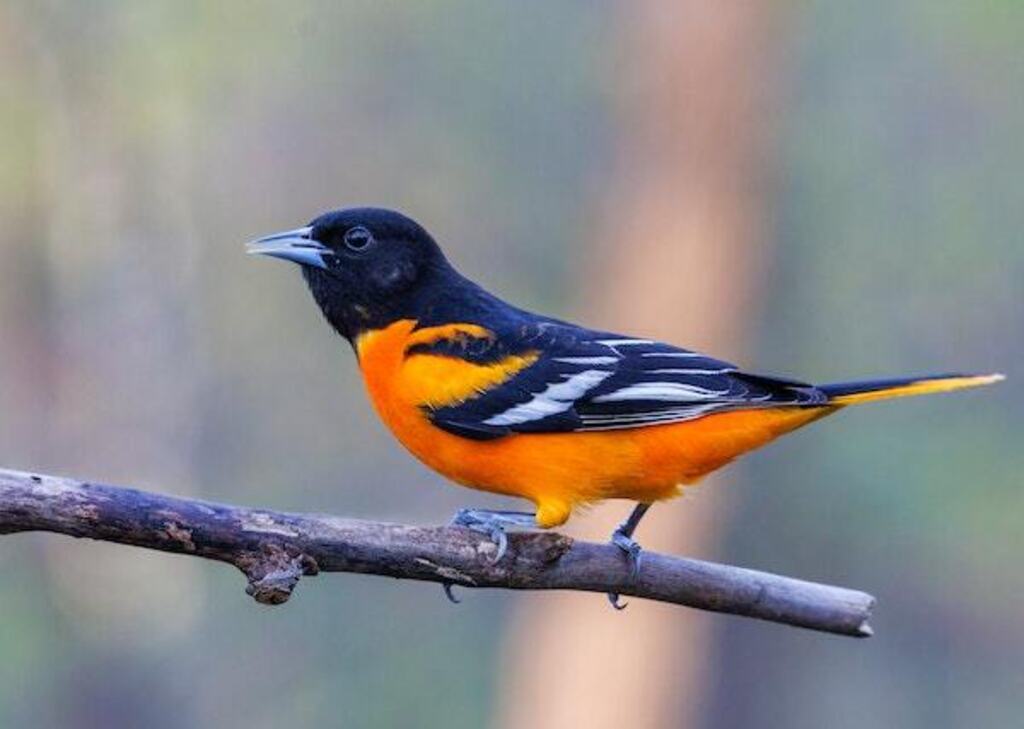Baltimore Orioles are small, bright orange and black birds known for their melodious songs and striking appearance.
They are a common sight in North America, particularly in the eastern part of the continent, where they breed in summer and migrate south for the winter.
While Baltimore Orioles are primarily insectivores, they also enjoy consuming a variety of fruits, nectar, and other food sources.
One question that often arises among bird enthusiasts is “Do Baltimore Orioles eat nuts? and, if so, what types of nuts they prefer.
This article aims to provide an overview of Baltimore Orioles’ diet, including the common foods they consume, and whether or not they eat nuts.
We will explore the types of nuts Baltimore Orioles might prefer, the benefits of providing nuts for them, and how to offer nuts to these birds.
Additionally, we will share other tips for attracting Baltimore Orioles and conclude with our final thoughts on their diet and nut consumption.
Table of Contents
- 1 Overview of Baltimore Orioles’ Diet
- 2 Common Foods They Consume
- 3 Do Baltimore Orioles Eat Nuts?
- 4 Types of Nuts They Might Prefer
- 5 Benefits of Providing Nuts for Orioles
- 6 How to Offer Nuts to Baltimore Orioles
- 7 Other Tips for Attracting Baltimore Orioles
- 8 Final Thoughts on Baltimore Orioles’ Diet and Nut Consumption
- 9 Frequently Asked Questions
- 9.1 What other types of food do Baltimore Orioles consume besides nuts?
- 9.2 How do Baltimore Orioles benefit the ecosystem?
- 9.3 What time of day are Baltimore Orioles most active?
- 9.4 Do Baltimore Orioles migrate to different areas during the winter months?
- 9.5 How can Baltimore Orioles be protected from predators in the wild?
- 10 Conclusion
- 11 Author
Overview of Baltimore Orioles’ Diet
An understanding of the dietary habits of Baltimore Orioles can provide valuable insights into their ecological role and relationships with other species.
Baltimore Orioles are primarily insectivorous birds, feeding on a variety of insects such as caterpillars, beetles, and grasshoppers.
Insects make up a significant portion of their diet, especially during the breeding season, when they need high protein to support their offspring.
However, Baltimore Orioles also consume nectar, fruits, and berries, which provide them with the necessary nutrients and energy for their long migration.
Their migration patterns influence their food sources as they travel through different regions, adapting to the available foods in each area.
Understanding the food sources of Baltimore Orioles is crucial for their conservation, as changes in habitat and climate can affect the availability of their preferred foods.
In the subsequent section, we will explore the common foods they consume, providing further insight into their dietary habits.
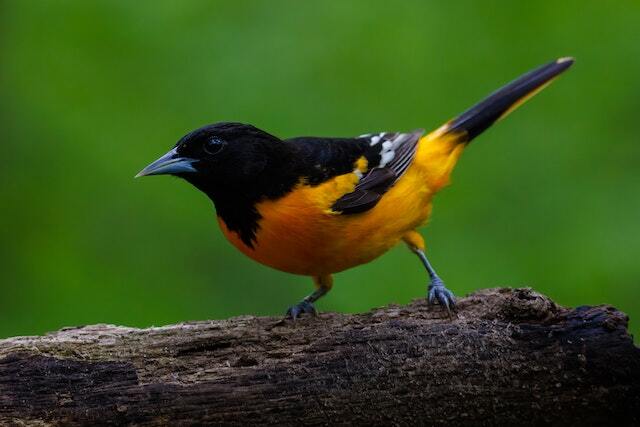
Common Foods They Consume
The dietary habits of Baltimore Orioles are notable for their varied intake of seeds, fruit, and insects.
For instance, research has shown that during the breeding season, orioles consume a higher proportion of animal-based foods to meet the nutritional demands of their young.
Insects play a crucial role in their diet, constituting a significant portion of their protein intake.
However, orioles are also known to forage for ripe fruits, such as berries and grapes, during migration and winter when insects are scarce.
They have adapted to different foraging techniques, such as searching for insects on leaves and branches, probing flowers for nectar, and using their long beaks to extract seeds from fruits.
In addition, Baltimore Orioles can be attracted to feeding stations that offer nectar, jelly, and fruit.
These feeding stations can supplement their natural diet and provide a reliable food source for them.
With these varied dietary habits, it is natural to wonder: do Baltimore orioles eat nuts?
Do Baltimore Orioles Eat Nuts?
Nuts, although commonly consumed by birds, do not appear to be a significant component of the Baltimore oriole’s diet, based on available research on their foraging habits.
These birds typically inhabit deciduous forests, woodlands, and gardens, and are known to feed on insects, fruits, and nectar.
While nuts do provide a high nutritional value for birds, it seems that Baltimore Orioles have not developed a strong preference for them.
However, it is worth noting that different species of nuts may be more appealing to these birds than others, depending on their taste, texture, and availability.
In the next section, we will explore the types of nuts that Baltimore orioles might prefer, based on their natural habitat and dietary preferences.
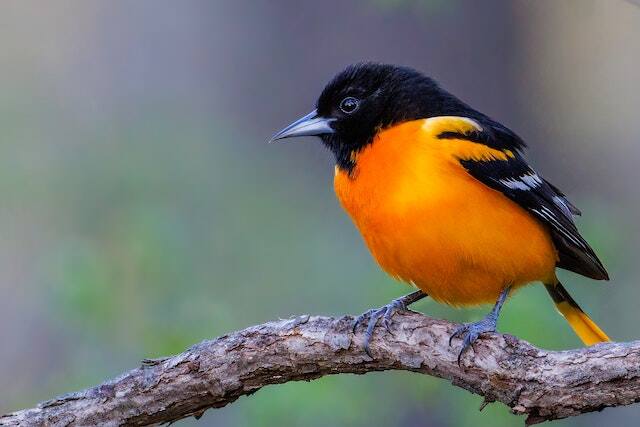
Types of Nuts They Might Prefer
When it comes to the nuts that Baltimore Orioles might prefer, there are a few key options to consider.
First, many bird enthusiasts recommend offering peanuts, which are a high-fat food that can be a great source of energy for these birds.
Additionally, sunflower seeds are another popular choice, as they are also high in fat and can help attract Orioles to your feeder.
Finally, suet is a type of bird food that is made from animal fat and is often offered in cakes or blocks, which can be a great source of energy for Orioles during the winter months.
Peanuts
Peanuts are a common food source for many wildlife species, including some birds. Baltimore Orioles are one such species that have a nutty relationship with peanuts. These birds are known to feed on peanuts, especially during their migration patterns.
Peanuts provide a high amount of protein and fat, which is necessary for birds to maintain their energy levels during long flights. They are also easy to carry and store, making them a convenient food source for Baltimore Orioles.
Apart from birds, peanuts are also consumed by other wildlife species, such as squirrels and chipmunks.
However, it is important to note that peanuts should be fed in moderation, as they can cause health problems if consumed in large quantities.
Sunflower seeds, on the other hand, are also a popular food choice for Baltimore Orioles and are a great alternative to peanuts.
Sunflower Seeds
Sunflower seeds have become a popular food choice for certain wildlife species due to their high nutritional value and portability, making them a ‘two birds with one stone’ solution for maintaining energy levels during migration and storage.
These seeds are rich in healthy fats, protein, fiber, and essential vitamins and minerals, including vitamin E, magnesium, and selenium.
Orioles are among the wildlife species that are known to enjoy sunflower seeds, as they provide the energy needed to fuel their long-distance migration and breeding activities.
In fact, bird enthusiasts often use sunflower seeds as a bait to attract orioles to their feeders.
Additionally, sunflower seeds can be used in various recipes, such as sunflower seed butter, pesto, and granola bars, to name a few.
These recipes offer a delicious way to incorporate sunflower seeds into our diets and reap their health benefits.
Moving forward, another popular food choice for wildlife is suet, which is a high-energy food made of animal fat and other ingredients.
Suet
While sunflower seeds are a popular food source for Baltimore Orioles, they are not the only option available.
Another alternative that can be offered to these birds is suet, which is a high-energy food that can help them sustain their energy levels during migration and breeding seasons.
Suet is a mixture of fat and other ingredients, such as seeds and fruits, that is commonly used as a bird food.
It is rich in calories and provides essential nutrients such as protein and fat, which are important for the birds’ development and survival.
However, it is important to note that some suet products may contain ingredients that are harmful to birds, such as hydrogenated oils and preservatives.
Therefore, it is recommended to choose suet alternatives that are free of these harmful ingredients.
In terms of nutritional value, suet can be a great addition to an oriole’s diet, providing them with the necessary nutrients to support their health and well-being.
Moving on to the benefits of providing nuts for orioles, these birds are known to feed on a variety of nuts, including peanuts, almonds, and walnuts.
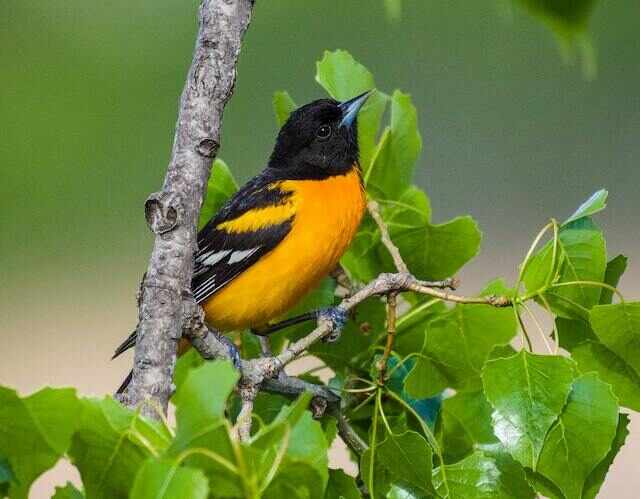
Benefits of Providing Nuts for Orioles
The provision of nutrient-rich food sources has been shown to positively impact bird populations, potentially leading to increased reproductive success and overall health.
Orioles are known for their feeding habits, which include consuming insects, nectar, and fruit. However, nuts also provide a valuable source of nutrition for these birds.
Here are four benefits of providing nuts for Baltimore Orioles:
1) High in protein and fat, nuts provide a concentrated source of energy that can help birds survive during periods of food scarcity.
2) Nuts are also rich in vitamins and minerals that are essential for maintaining good health.
3) Offering nuts can attract a wider variety of bird species to your backyard, creating a more diverse and vibrant ecosystem.
4) Finally, nuts can be easily stored and offered throughout the year, providing a reliable food source for Baltimore Orioles during their migration and winter months.
By providing nuts for Baltimore Orioles, bird enthusiasts can help support the health and wellbeing of these beautiful birds. To learn how to offer nuts to Baltimore Orioles, read on to the next section.
How to Offer Nuts to Baltimore Orioles
Providing nutrient-rich food sources such as nuts can enhance the health and wellbeing of avian populations, and as such, it is crucial for bird enthusiasts to learn effective methods for offering this valuable food source.
When it comes to Baltimore Orioles, offering nuts can be done in a variety of ways. DIY bird feeders are a popular method for providing nuts, and can be made using simple materials such as a plastic bottle or a pine cone.
By filling these feeders with nuts, bird enthusiasts can attract songbirds such as Baltimore Orioles to their gardens and yards.
Additionally, offering nuts in a loose form on a platform feeder or scatter feeding them on the ground can also be effective.
However, it is important to note that nuts may attract other wildlife, such as squirrels and raccoons, so it is recommended to place the feeders in an area away from these animals.
By incorporating these methods, bird enthusiasts can attract Baltimore Orioles and other songbirds to their outdoor spaces and enhance their overall bird-watching experience.
Other tips for attracting Baltimore Orioles include offering fruit and nectar, as well as providing a water source for these birds to drink and bathe in.
Other Tips for Attracting Baltimore Orioles
In addition to offering nuts to Baltimore Orioles, there are other tips that can attract these beautiful birds to your yard.
Providing a bird feeder with a variety of fruits, nectar, and jelly can be an effective way to entice them.
Orioles also enjoy bathing, so having a bird bath in your yard can be another way to attract them.
It’s important to keep the feeder and bath clean to prevent the spread of diseases among birds.
By providing a variety of food and a clean environment, you can increase the chances of seeing Baltimore Orioles in your yard.
Moving on to the subsequent section about the final thoughts on Baltimore Orioles’ diet and nut consumption, it’s important to understand the nutritional benefits of nuts for these birds.
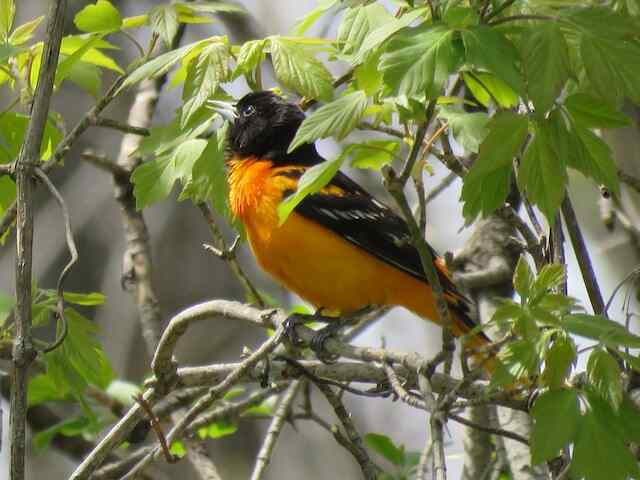
Final Thoughts on Baltimore Orioles’ Diet and Nut Consumption
Understanding the feeding habits of Baltimore Orioles and the nutritional benefits of nut consumption can provide insight into creating a diverse and healthy environment for these birds in your yard.
While Baltimore Orioles primarily consume nectar and insects, they also incorporate fruits, berries, and some types of nuts into their diet.
In particular, Baltimore Orioles are known to enjoy peanuts and peanut butter, which provide a good source of protein and fat.
Incorporating these foods into your bird feeder can attract these birds to your yard and provide them with the necessary nutrients for their migration patterns.
Overall, understanding the dietary preferences and habits of Baltimore Orioles can enable individuals to create a welcoming and nourishing environment for these birds.
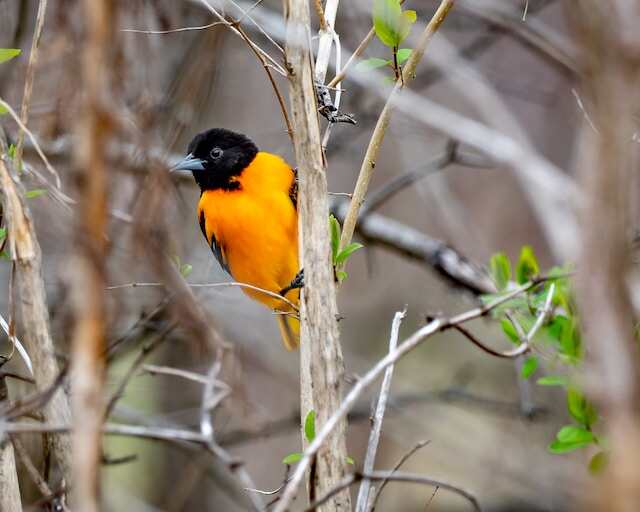
Frequently Asked Questions
What other types of food do Baltimore Orioles consume besides nuts?
Baltimore Orioles are known to consume a variety of foods in addition to nuts. They are considered to be primarily insectivorous, meaning that they feed on insects such as caterpillars, beetles, and grasshoppers.
However, they are also attracted to bird feeders containing nectar, jelly, and fruits such as grapes, oranges, and apples.
In fact, Baltimore Orioles are known to be particularly fond of fruit trees, such as cherry and mulberry trees.
These birds have a unique ability to extract nectar from flowers, which is an important source of energy for them during migration.
So, while nuts may be a part of their diet, Baltimore Orioles rely on a diverse range of foods to meet their nutritional needs.
Understanding their dietary habits can help us create bird-friendly habitats that support their survival and health.
How do Baltimore Orioles benefit the ecosystem?
The Baltimore Oriole, also known as Icterus galbula, plays a crucial role in the ecosystem by contributing to the pollination of various plant species.
They often build their nests in the forks of tree branches, utilizing natural resources to create a sturdy and safe home for their young.
Oriole nest building is a complex process that requires a specific technique and intricate weaving of materials. These nests are often used by other bird species once the Orioles have moved on.
The Baltimore Oriole’s contribution to pollination is essential, as they feed on nectar, which allows them to transfer pollen from one flower to another.
This process leads to the production of fruits and seeds, which are essential in maintaining the plant population.
Therefore, the Baltimore Oriole’s presence in the ecosystem is vital to its balance and sustainability.
What time of day are Baltimore Orioles most active?
Baltimore Orioles are known for their striking orange and black plumage and are a common sight in North America during the summer months.
These birds are most active during the early morning and late afternoon, with feeding habits that consist of nectar, fruit, and insects.
Orioles are also known for their unique nesting behavior, which involves weaving fibers to create hanging nests.
These nests are usually found in trees or shrubs, and the birds will often return to the same nesting site year after year.
Migration patterns and habitat preferences also play a significant role in the life of the Baltimore Oriole. These birds are migratory and will travel to Central and South America during the winter months.
They prefer open woodlands and riparian habitats, where they can find their preferred food sources and nesting locations.
Understanding the nesting, feeding habits, migration patterns, and habitat preferences of these birds is essential for conservation efforts and promoting their survival.
Do Baltimore Orioles migrate to different areas during the winter months?
Baltimore Orioles are known for their vibrant colors and melodious songs, and they are native to the eastern regions of North America.
During the winter months, these birds migrate to different areas, depending on the availability of food and suitable habitats.
While some Baltimore Orioles may migrate to southern regions of the United States, others may travel as far south as Central and South America.
This winter migration is crucial for the survival of these birds as they rely on different food sources and habitats than those found in their breeding grounds.
Although Baltimore Orioles are primarily insectivorous, their diet may also include fruits and nectar.
There is limited research on the nut consumption of Baltimore Orioles during their winter migration.
However, it is known that they consume nuts and seeds during the breeding season as a source of protein and energy.
How can Baltimore Orioles be protected from predators in the wild?
It is ironic that while humans have been encroaching on the natural habitats of Baltimore Orioles, predators have also been preying on these beautiful birds.
Predator prevention is an essential concern for the conservation of Baltimore Orioles.
Habitat restoration and providing safe nesting sites can go a long way in protecting these birds from predators.
Research-based evidence suggests that restoring natural habitats can help create a balance in the ecosystem and reduce the incidence of predators.
Furthermore, the use of deterrents such as netting, decoys, and visual and audio alarms can also help prevent predation.
Efforts to protect Baltimore Orioles from predators will require a collaborative approach from governments, conservation organizations, and the general public.
Given the desire for innovation to solve environmental challenges, implementing effective predator prevention strategies can help secure the future of these birds.
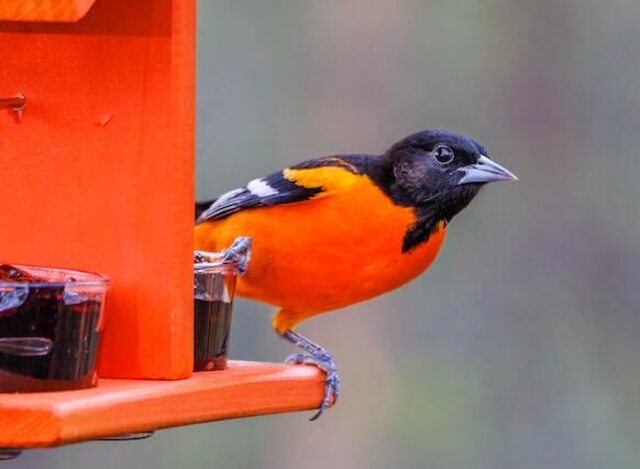
Conclusion
In conclusion, the Baltimore oriole’s diet consists mainly of insects, fruits, and nectar. However, they do consume nuts as well. These birds prefer smaller nuts like peanuts and sunflower seeds.
Providing nuts in your backyard can be a great way to attract these beautiful birds. Nuts offer various benefits to orioles, such as providing them with high-energy food and helping them during migration.
To attract Baltimore Orioles, you can offer nuts in feeders or by placing them on platforms. It’s essential to keep the nuts fresh and avoid offering them in shell form.
Additionally, planting fruit trees and flowers that produce nectar can also attract orioles.
In conclusion, Baltimore Orioles are fascinating birds with unique dietary needs. Offering nuts can be a great way to attract them and promote their overall health and well-being.
As the saying goes, ‘Providing nuts for Baltimore Orioles is like opening a door to a world of beauty and wonder.’

